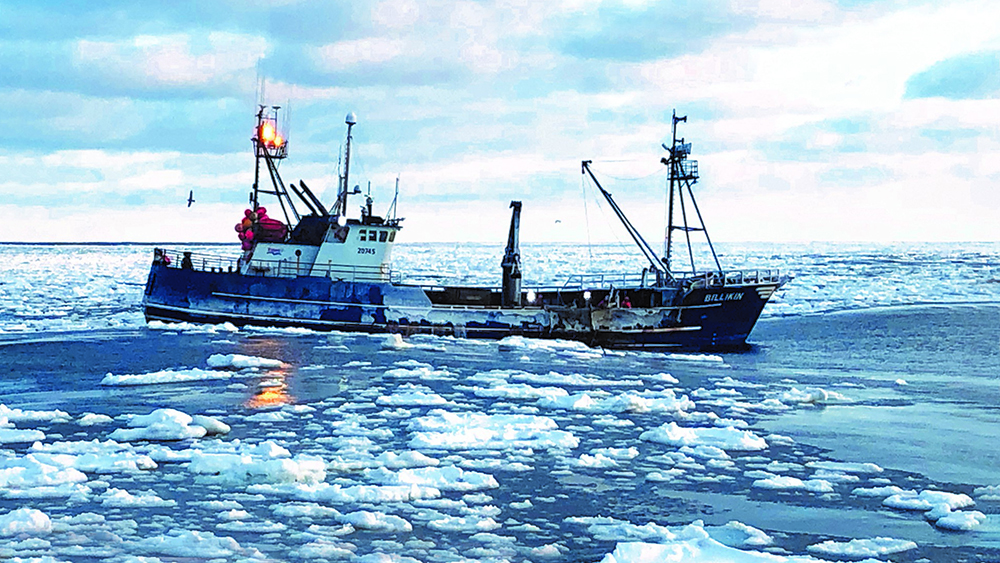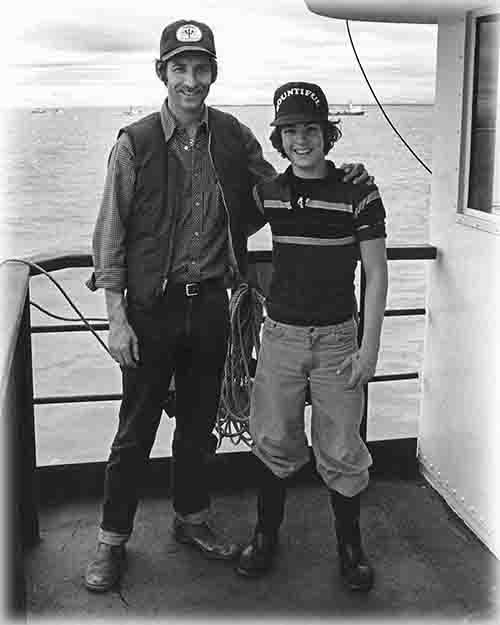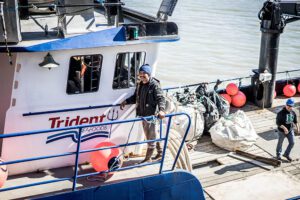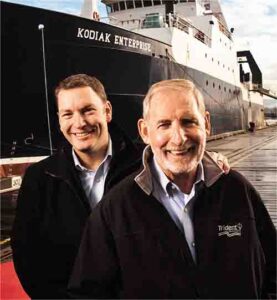
Trident Seafoods Corp., the nation’s largest seafood company, is marking its 50th year in 2023, an industry giant spawned from the dreams of a young man whose first job in Alaska was shoveling shrimp for $1.47 an hour.
The size and scope of Trident Seafoods today “was never our ambition,” said Chief Executive Officer Joe Bundrant, the son of company founder Chuck Bundrant.
The elder Bundrant, a Tennessee farm boy, had heeded his parents’ advice to get a college education, but dropped out after a year and a half and headed for the World’s Fair in Seattle in 1962, his son said.
He’d seen the adventure film “North to Alaska,” so when he ran out of money, young Chuck headed for Alaska and got the job shoveling shrimp in the town of Adak.
From there he went to Kodiak and landed a job on a crab boat. By 1966, the year Joe was born, his dad had purchased his first fishing boat.
In 1973, Chuck built the 135-foot Billikin, the first boat to catch and process crab at sea, and soon was selling Alaska king crab all over the U.S.

“It was an amazing start,” Joe said. Five years later the elder Bundrant built yet another vessel, the Bountiful, which marked his first entry into the Bristol Bay salmon fishery.
Chuck Bundrant, who died in October 2021 at the age of 79, was different, his son said.
“He was a very special human being. He led by example. Our (company) culture is very much that way, one of drive and determination,” Chuck Bundrant said, adding that his father Joe, “had the ability to attract and motivate people. He was very unselfish. He wanted to build a great organization that would last. He was willing to take big risks and roll the dice at the right time.”
As the company grew, so did its commitment to the communities they worked in, its employees and customers. If, for example, a harvester fishing salmon for Trident needed a vessel part in the middle of the Bristol Bay fishery, it very likely might be delivered by Chuck Bundrant himself, aboard a helicopter in the Bay.
The former editor and publisher of The Cordova Times, a weekly newspaper for the Prince William Sound community of Cordova, still talks about when she sat in the Cordova High School gym watching a boys basketball clinic. The Bundrant family had brought in professional basketball players to instruct the youngsters.
Jennifer Gibbins recognized Chuck Bundrant and introduced herself as the new owner of the weekly. He asked her to let Trident Seafoods know what they could do to help.
“They were totally supportive after that,” Gibbins said. “He helped me save the community newspaper.”
Several years and two owners later, Trident still runs advertisements in The Cordova Times.
Today, Trident manages a network of catcher and catcher processor vessels and processing plants across 12 locations in Alaska. The vertically integrated firm, with some 9,000 employees worldwide, is supported by manufacturing and sales locations in Latin America, China, Japan, Germany, France and The Netherlands.
Trident currently sells frozen, canned, smoked and ready-to-eat seafood products for the wholesale, retail and food-service markets under several brand names in more than 55 countries.
Like all in the fishing industry, Trident Seafoods has weathered good times and tough ones, including the ongoing global COVID-19 pandemic and climate change.

When COVID-19 spread to Alaska, Trident Seafoods took the precautionary and expensive step of protecting workers and the coastal fishing communities where they labored. The company tested everyone hired from the Lower 48 before they traveled to Alaska to be sure they were COVID free.
Then they housed them for two weeks in an Anchorage hotel. Workers were required to stay in their rooms, but received three meals a day and laundry service until Trident could have them tested again. Only then did company officials dispatch them to their assignments at rural processing facilities.
“It was worth it,” Joe said, recalling that back on March 11, 2020 “we said we would do whatever it takes. Money was not an option. We knew if we didn’t take it seriously, we would have regrets. We had independent fishermen and coastal communities depending on us. The spirit of Trident was alive and well.”
Climate change has presented another big challenge for the company.
“There has been climate change since the beginning of time, but the constant is the Bering Sea has continued to produce an enormous amount of seafood,” Joe said.
His dad started fishing the Bering Sea in 1973 and never saw any cod until the 1980s, he said, and crab are constantly in a conservation mode.
Trident has worked continuously with the National Marine Fisheries Service and Alaska Department of Fish and Game, providing grants to fund research on ocean conditions and seafood species.

“Alaska has the best fisheries management in the world, and we have great confidence in the scientists,” he said. “I am optimistic about the future of the fisheries because of the science.”
“At present it’s ‘big runs, small fish,’ but these fisheries are cyclical,” he remarked. “Every year you don’t know what you are going to get, but Trident has been able to adapt to these changes for over 50 years.”
One of Joe’s earliest memories of working with Trident Seafoods was delivering crab on the back of a truck to Ray’s Boathouse in Seattle. Another is the summer of 2021, when he toured all of Trident’s Alaska operations with his dad.
“We did it every year, but that year was extremely special, touring the state and seeing where he had been and all the people he loved and cared about,” he commented.
And his optimism about Trident being a multi-generational family employer is strong. Joe, who was appointed the company’s CEO in 2013, has two of his daughters working for the company in sales, and two sons who have fished commercially. One of them now fishes for Trident.
“Nobody in the family is allergic to fish,” he said, “or hard work.”
Margaret Bauman is an Alaska journalist and photographer with an extensive background in Alaska’s industries and environmental issues related to those industries. A long-time Alaska resident, she has also covered news of national and international importance in other states on the staff of United Press International, the Associated Press, and CBS News.
